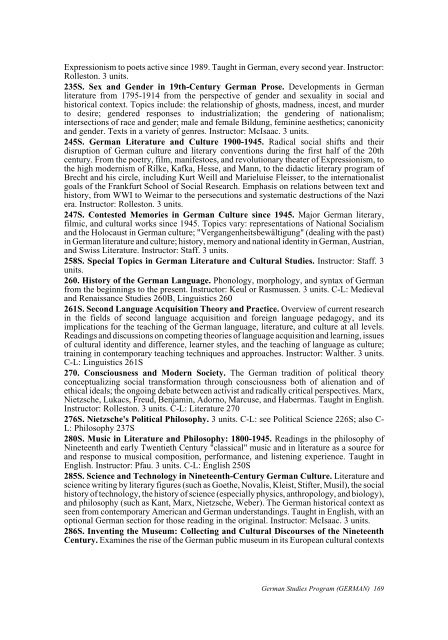2005-06 - Office of the Registrar - Duke University
2005-06 - Office of the Registrar - Duke University
2005-06 - Office of the Registrar - Duke University
Create successful ePaper yourself
Turn your PDF publications into a flip-book with our unique Google optimized e-Paper software.
Expressionism to poets active since 1989. Taught in German, every second year. Instructor:<br />
Rolleston. 3 units.<br />
235S. Sex and Gender in 19th-Century German Prose. Developments in German<br />
literature from 1795-1914 from <strong>the</strong> perspective <strong>of</strong> gender and sexuality in social and<br />
historical context. Topics include: <strong>the</strong> relationship <strong>of</strong> ghosts, madness, incest, and murder<br />
to desire; gendered responses to industrialization; <strong>the</strong> gendering <strong>of</strong> nationalism;<br />
intersections <strong>of</strong> race and gender; male and female Bildung, feminine aes<strong>the</strong>tics; canonicity<br />
and gender. Texts in a variety <strong>of</strong> genres. Instructor: McIsaac. 3 units.<br />
245S. German Literature and Culture 1900-1945. Radical social shifts and <strong>the</strong>ir<br />
disruption <strong>of</strong> German culture and literary conventions during <strong>the</strong> first half <strong>of</strong> <strong>the</strong> 20th<br />
century. From <strong>the</strong> poetry, film, manifestoes, and revolutionary <strong>the</strong>ater <strong>of</strong> Expressionism, to<br />
<strong>the</strong> high modernism <strong>of</strong> Rilke, Kafka, Hesse, and Mann, to <strong>the</strong> didactic literary program <strong>of</strong><br />
Brecht and his circle, including Kurt Weill and Marieluise Fleisser, to <strong>the</strong> internationalist<br />
goals <strong>of</strong> <strong>the</strong> Frankfurt School <strong>of</strong> Social Research. Emphasis on relations between text and<br />
history, from WWI to Weimar to <strong>the</strong> persecutions and systematic destructions <strong>of</strong> <strong>the</strong> Nazi<br />
era. Instructor: Rolleston. 3 units.<br />
247S. Contested Memories in German Culture since 1945. Major German literary,<br />
filmic, and cultural works since 1945. Topics vary: representations <strong>of</strong> National Socialism<br />
and <strong>the</strong> Holocaust in German culture; "Vergangenheitsbewältigung" (dealing with <strong>the</strong> past)<br />
in German literature and culture; history, memory and national identity in German, Austrian,<br />
and Swiss Literature. Instructor: Staff. 3 units.<br />
258S. Special Topics in German Literature and Cultural Studies. Instructor: Staff. 3<br />
units.<br />
260. History <strong>of</strong> <strong>the</strong> German Language. Phonology, morphology, and syntax <strong>of</strong> German<br />
from <strong>the</strong> beginnings to <strong>the</strong> present. Instructor: Keul or Rasmussen. 3 units. C-L: Medieval<br />
and Renaissance Studies 260B, Linguistics 260<br />
261S. Second Language Acquisition Theory and Practice. Overview <strong>of</strong> current research<br />
in <strong>the</strong> fields <strong>of</strong> second language acquisition and foreign language pedagogy, and its<br />
implications for <strong>the</strong> teaching <strong>of</strong> <strong>the</strong> German language, literature, and culture at all levels.<br />
Readings and discussions on competing <strong>the</strong>ories <strong>of</strong> language acquisition and learning, issues<br />
<strong>of</strong> cultural identity and difference, learner styles, and <strong>the</strong> teaching <strong>of</strong> language as culture;<br />
training in contemporary teaching techniques and approaches. Instructor: Wal<strong>the</strong>r. 3 units.<br />
C-L: Linguistics 261S<br />
270. Consciousness and Modern Society. The German tradition <strong>of</strong> political <strong>the</strong>ory<br />
conceptualizing social transformation through consciousness both <strong>of</strong> alienation and <strong>of</strong><br />
ethical ideals; <strong>the</strong> ongoing debate between activist and radically critical perspectives. Marx,<br />
Nietzsche, Lukacs, Freud, Benjamin, Adorno, Marcuse, and Habermas. Taught in English.<br />
Instructor: Rolleston. 3 units. C-L: Literature 270<br />
276S. Nietzsche's Political Philosophy. 3 units. C-L: see Political Science 226S; also C-<br />
L: Philosophy 237S<br />
280S. Music in Literature and Philosophy: 1800-1945. Readings in <strong>the</strong> philosophy <strong>of</strong><br />
Nineteenth and early Twentieth Century "classical" music and in literature as a source for<br />
and response to musical composition, performance, and listening experience. Taught in<br />
English. Instructor: Pfau. 3 units. C-L: English 250S<br />
285S. Science and Technology in Nineteenth-Century German Culture. Literature and<br />
science writing by literary figures (such as Goe<strong>the</strong>, Novalis, Kleist, Stifter, Musil), <strong>the</strong> social<br />
history <strong>of</strong> technology, <strong>the</strong> history <strong>of</strong> science (especially physics, anthropology, and biology),<br />
and philosophy (such as Kant, Marx, Nietzsche, Weber). The German historical context as<br />
seen from contemporary American and German understandings. Taught in English, with an<br />
optional German section for those reading in <strong>the</strong> original. Instructor: McIsaac. 3 units.<br />
286S. Inventing <strong>the</strong> Museum: Collecting and Cultural Discourses <strong>of</strong> <strong>the</strong> Nineteenth<br />
Century. Examines <strong>the</strong> rise <strong>of</strong> <strong>the</strong> German public museum in its European cultural contexts<br />
German Studies Program (GERMAN) 169









